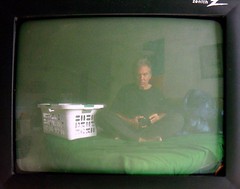Idle Chatter
I posted this at flickr a week or so ago and only now the thought hit me that this could be a metaphor for me and my brothers.
I'm the third of four and — depending upon how you look at it — either slightly askew or just a little different. I don't know how it is that I grew up to be so different from them, but I did.
If you were to ask me what the four of us have in common, I don't know that there would be much more than a handful of things I could cite. We all pretty much liked the same things as kids, but that surely changed in our post-high school years. They all like to say that I'm my mother's favourite, and perhaps I am. If indeed it's true, I wonder sometimes how that might have come to be. I don't think that I was really any different in the way I acted towards her as a kid than did my brothers. I didn't really excel as a student or anything. Might it have been that I was more productive in the Mothers Day cards and such than they were? Probably not.
I have also wondered many times about why I was the only one (that I can recall) to get piano lessons. Also, I was the only one to have received encouragement with my knack for drawing, having received a "How To Draw" kit which was based on a television show we would watch.
As for the piano lessons, my mother used to tell me that I could be the next Liberace. He was somewhat popular at the time (so that was her motive, I guess) and turning classical music on its ear a bit with his penchant for flamboyance, and the manner in which he injected a modern pop-ish edge to classical tunes. An ever-present candelabra was his signature, as were his gaudy diamond rings and sequined tuxedos.
Hah! You don't know how relieved I am now that that wish didn't happen to come true!
I dropped piano lessons after a couple of years as I had other things on my mind, I think. Baseball was still my activity of choice and I was beginning to notice girls with a bit more of an interested eye (distancing me further from the Liberace mold! Heh!) and while I liked my piano teacher, Pat Perlaky, a lot, I just didn't have the ambition to continue. I think that I performed one recital at Pat's home along with a couple other of her students. I don't recall much about it, except that it wasn't anything exceptional.
Back to the brothers...
For some reason, I took more to social causes (anti-war, pro-environment) during high school than my brothers did. Jim, the youngest, didn't really experience the angst about going to Vietnam, but the rest of us did. Bob, the oldest, joined the Air Force at some point. I Believe he enlisted. Thankfully, for whatever reasons, he never had to serve on active combat duty. His life then took turns that have pretty much been shrouded in mystery (for me) ever since. At any rate, Bob was the only one to serve in the military and actually face the possibility that he'd be sent into a war zone.
Mike also was of age with regard to the draft but lucked out. I recall watching one of the Selective Service's lotteries as it was broadcast on television, and his number (they used birthdates, if you're not familiar) never came up very high. Neither did mine, but by the time I was old enough to serve, Nixon had finally pulled the troops out. Mike tried to enlist, but Mom decided to get him braces for his teeth, thereby also getting him a deferment. Sneaky.
Considering that we're within three years of each other, and went to high school at about the same time (I was a freshman when he was a senior), it's beyond me how he never developed much of a social conscience. Many of his friends were peace activists to some degree, and environmental activists, but he didn't follow that path. Years later, when talking politics (he's a "Reagan Republican"), I posed the question (with regard to the environment), "Do you want your grandchildren and great-grandchildren living in such a polluted environment?" and he essentially dusted it off with, "What the hell do I care? I'll be dead." I suppose that's the typical libertarian response.
I never really knew Bob(by) that well growing up, to be honest. He's nine and a half years older than I am and I'm guessing that he left the house for the Air Force before I was even ten years old. I still recall a night which I recall him being around but we didn't really live in the same house for that long of a time. Oddly enough, I feel that I'm more like Bob in certain ways. He's always been a dreamer, I think... always having his sights set on something that would eventually be out of reach. And I think I have similar tendencies at times. I tend, however, to keep my dreams reined in a bit, closer to the vest and a little bit more within reach.




